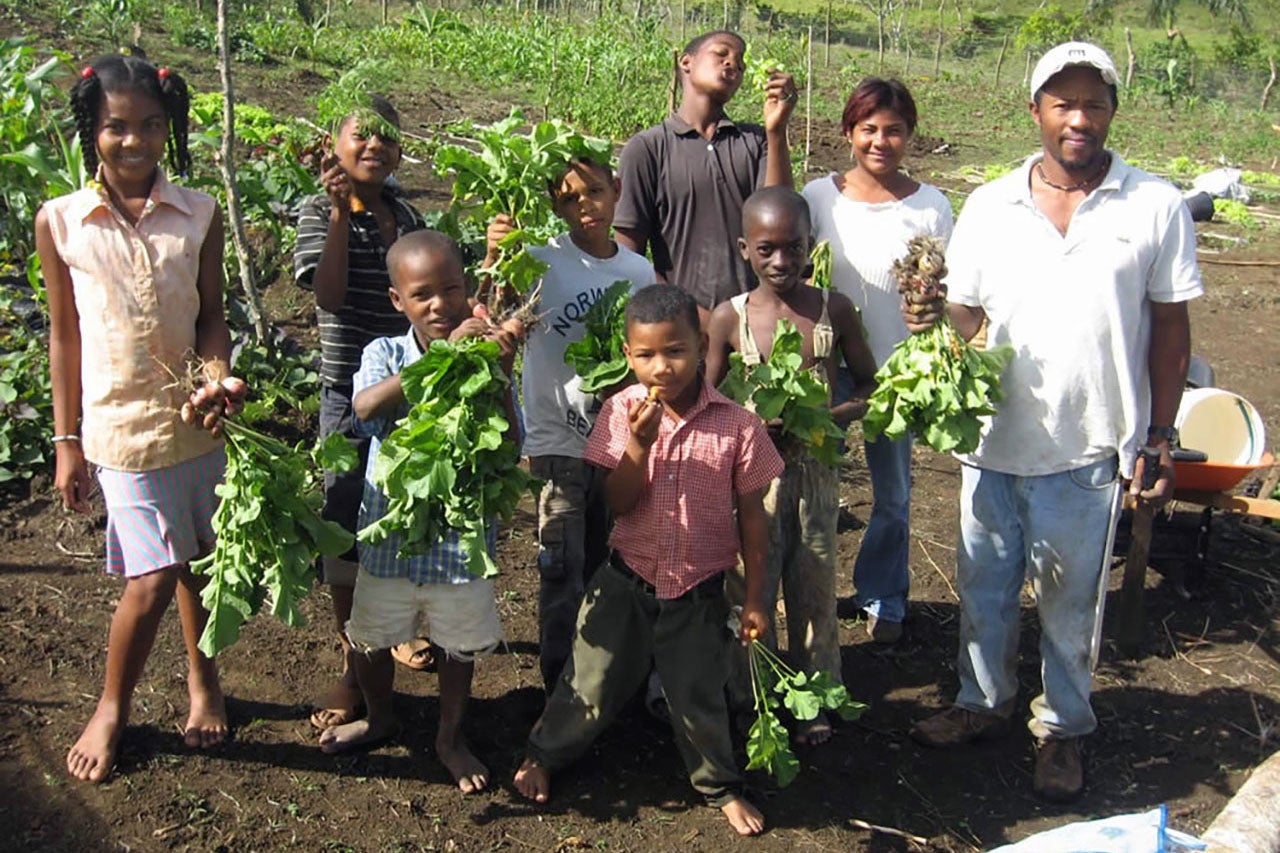College of Charleston graduates are making an impact all over the globe. And for some, their contributions are magnified by the savvy approaches they’ve developed to operate their respective initiatives. That’s definitely the case with Sarah Koch ’04.
Koch is the co-founder and executive director of Development in Gardening (DIG), an international nonprofit that works to address the nutrition requirements of some of the world’s most needy individuals – people living with HIV. Throughout her organization’s existence (it’s been around for just over a decade) it has grown tremendously in scope and impact, largely because Koch had the foresight to establish DIG on a sustainable, regenerative model.
For Koch, it all started with a stint in the Peace Corps. Immediately after graduating as a double major in art history and studio art, she joined the humanitarian organization and was posted to serve in a remote village in Senegal, working in rural health. She taught nutrition, hygiene and pre- and post-natal care.
While there, Koch met a fellow Peace Corps volunteer – Steve Bollinger – who was experimenting with a micro garden at a hospital for HIV patients. His hope was that these patients wouldn’t only derive nutrition from the garden’s produce, but they’d also bond with one another, finding solace and community in that work. In many nations of the world, people living with HIV are regarded as outcasts and not accepted into daily society.
That initial garden project was so successful, Koch says, that Bollinger envisioned expanding the concept. He asked her to join him in that work.
“He didn’t have to ask twice,” she says.
Fast forward to 2018 and DIG is now active in the African nations of Kenya and Uganda. To date, the organization has established gardens in 15 HIV clinics/hospitals; instructed youth in four orphanages and 11 schools; graduated 50 community groups; established 3,000-plus individual home gardens; and fed over 45,000 people in 11 different countries. DIG has done all that while also fostering entrepreneurship.
Koch explains that she and her staff not only establish gardens, but they conduct educational sessions and on-the-job training for the patients and others who will ultimately take over the gardens once DIG departs. The farmers, as she calls them, learn to fashion growing containers out of found materials such as automobile tires and trash bins. And the business model includes selling the produce to the hospital kitchens and then plowing those proceeds back into the garden.
“Each project serves as a working model for the community,” explains Koch. “It provides knowledge, increased nutrition and sustainable, part-time employment.”
The demonstration garden DIG established at Lwala Hospital in Kenya has now trained 184 individuals and helped foster 417 home gardens and 26 community gardens. It is just one of numerous success-breeds-success stories shared on the organization’s website.
Koch says that this experience has been a blessing for her, both personally and professionally.
“To see an idea move beyond yourself is incredibly rewarding. It’s also tremendously humbling when I spend time with our farmers and see just how this work has touched them,” she says. “During my last visit to Uganda, I spent time with a woman named Hope. Her husband had been abusing her and her kids, and one day she finally had enough. She packed the kids up and left the village to live with her sister. When we asked what gave her the courage to leave she said it was her DIG garden and that she now knows how she can provide financially for her family. She started a garden at her sister’s home, and is now selling in the local markets and hasn’t looked back. I could never have imagined that kind of impact 11 years ago and am consistently humbled by what these farmers have done with the smallest of seeds.”
Despite all these successes, there are still challenges.
“Differentiating DIG as more than just another agriculture organization is critical for us to rise above the noise of so many other nonprofits working in the world,” Koch explains. “Outwardly, we focus on using sustainable agriculture to provide food security and nutrition for the nutritionally vulnerable, but in the process we also address issues such as women’s empowerment, climate resilience, poverty reduction, anti-discrimination, infant and child well-being and more.”
Koch is keen to impart that each garden intervention her organization undertakes is designed to specifically serve each community’s unique needs.
“While we’re good at knowing how an agriculture program addresses bigger challenges in a community, explaining the value of this slower, more labor-intensive approach can be hard, particularly when donors want to see massive impact at a faster pace,” she says. “We’re learning how to stand strong against the shifting tides of development, and we’re always mindful that nothing is worth doing if the communities themselves are not interested in doing it – and doing it long after we leave.”
Featured image: Community members harvest a DIG garden.






